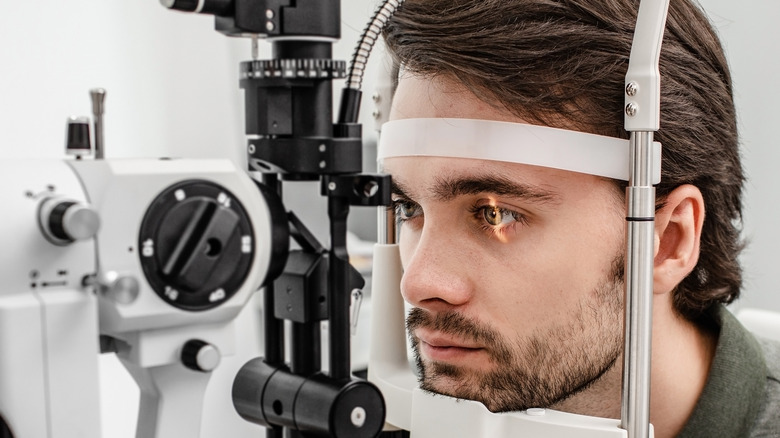Why Your Blurry Vision Might Be More Serious Than You Think
After staring at screens all day, you've probably experienced tired eyes or blurry vision. When you experience your vision getting blurry, you may think you just need to rub the tiredness out of your eyes, or that maybe it's time to get glasses. Or, if you already wear prescription eyeglasses or contact lenses and notice your eyesight getting worse, you may believe it's time for a new prescription. But blurry vision may not be as harmless as you suppose. If you're not able to see clearly, it could be a sign that something more serious is going on with your health.
According to Medicine Net, blurry vision is the loss of sharp eyesight or not being able to see the fine details. We are familiar with common conditions of the eye like nearsightedness, farsightedness, or astigmatism, but they are not always the reason behind your vision going blurry. A serious health condition could be causing your distorted eyesight, especially if prescription lenses don't correct the problem.
When blurry vision is a symptom of a chronic condition
If you notice that your vision has gone blurry and is staying that way, pay attention because you may be experiencing something more serious than eye fatigue. Blurry vision could be the first sign that you have a health condition happening outside of the eye. According to WebMD, blurry vision is an early symptom experienced by those who have multiple sclerosis (MS).
Multiple sclerosis is an inflammatory disease that can cause blurred vision due to optic neuritis, or, inflammation of the eye's optic nerve. Optic neuritis is very common among people diagnosed with MS. A three-year study conducted between 2015 and 2018 determined that monitoring the progression of optic neuritis is an appropriate tool to measure the progression of MS (via Frontiers in Neurology).
People living with diabetes also can experience blurry vision, though visual changes typically occur over time. In fact, high blood sugar levels found in people with diabetes can cause damage to the eye's blood vessels. This damage causes diabetic retinopathy, an eye disease that not only causes blurriness but permanent loss of vision (per WebMD).
Pay close attention to sudden blurry vision
One of the first signs of a stroke or transient ischemic attack (TIA) is blurred vision. According to Healthline, a stroke that involves the blood vessels of the eye can cause blurred vision in one eye or both. Anything that affects the brain can cause blurry vision. Although not as common as a stroke, a tumor can create pressure inside the skull that causes sudden blurry vision (via WebMD).
A detached retina is a medical emergency in which the retina detaches from the back of the eye. One may think that injury must take place for the retina to detach. However, retinal detachment can be a part of the aging process. When the retina detaches, it loses its supply of blood and oxygen. The blurriness is usually described as flashing lights or having dark floaters in the eye. If the retina is not repaired, it causes permanent loss of vision (via Healthline).
Blurred vision can be more than meets the eye. Regular vision screenings are important for keeping your eyes healthy and detecting if there is a more serious cause for your blurred vision.
When to seek medical help
No need to jump to panic the next time you experience blurry vision, however, as it is not always a cause for concern. For instance, according to Pearle Vision, blurry vision can occur alongside allergies, in addition to redness or swelling of the eyes. Blurry vision is also not uncommon in those who are pregnant, as fluid retention in the eyeballs can be a byproduct of hormonal changes. Blurry vision can also be a side effect experienced after surgery, such as Lasik or cataract surgery.
Alternatively, you may find yourself more prone to blurry eyes during certain times of day, such as while driving at night, when your eyes are naturally working overtime to continuously adjust between your dark surroundings and the bright lighting from oncoming headlights (via Vision Service Plan). However, severe difficulty with nighttime driving due to blurry eyes can be a sign of night blindness and should be discussed with your doctor.
While blurry vision often isn't a sign of anything serious, there are certain signs one should be on the lookout for indicating immediate medical care is needed, such as blurry vision that comes on abruptly (per Merck Manual). In addition, if you have an immune system disorder or if your blurry vision is accompanied by gradual or sudden severe vision loss (particularly if only in one eye), eye pain that strikes whether the eyes are still or in motion, or blind spots, this also warrants immediate evaluation by a physician.




